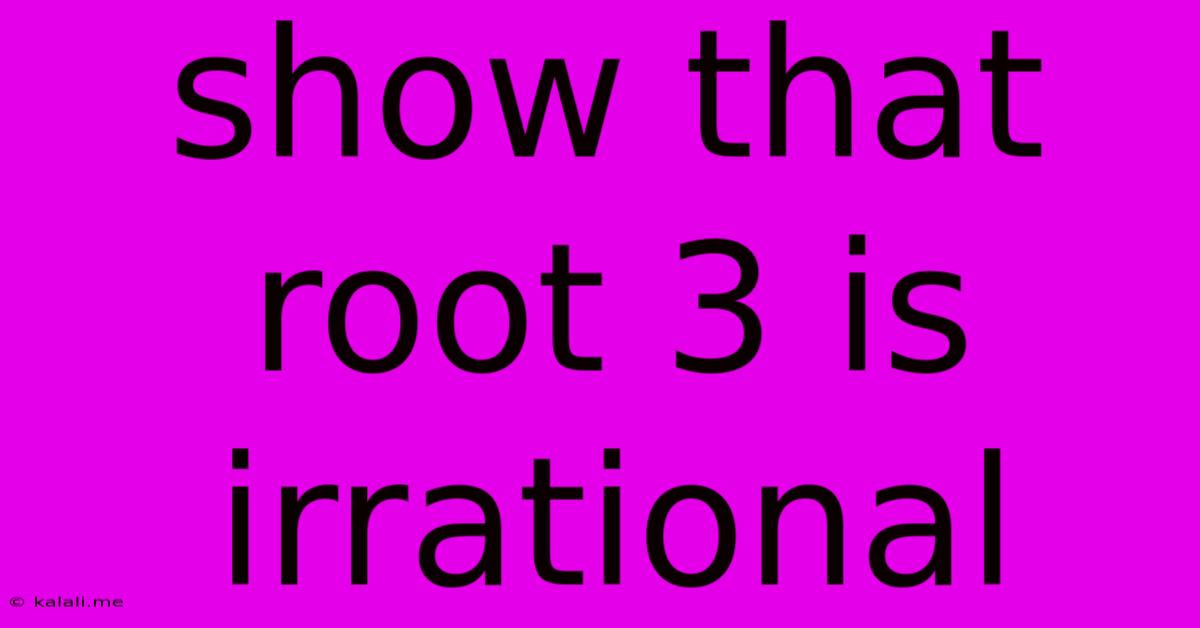Show That Root 3 Is Irrational
Kalali
May 19, 2025 · 3 min read

Table of Contents
Proving √3 is Irrational: A Step-by-Step Guide
Meta Description: This article provides a clear and concise proof that the square root of 3 is an irrational number, using the method of proof by contradiction. Learn the steps involved and understand the underlying mathematical concepts.
The question of whether √3 is rational or irrational is a classic problem in number theory. Understanding this proof is crucial for grasping fundamental concepts in mathematics. This article will guide you through a rigorous proof, explaining each step clearly. We'll use the widely accepted method of proof by contradiction.
Understanding Rational and Irrational Numbers
Before diving into the proof, let's define our terms. A rational number can be expressed as a fraction p/q, where p and q are integers, and q is not zero. Examples include 1/2, 3/4, and -5/7. An irrational number cannot be expressed as such a fraction; its decimal representation is non-terminating and non-repeating. Examples include π (pi) and e (Euler's number).
Proof by Contradiction: The Strategy
We'll use proof by contradiction, a powerful technique in mathematics. This involves assuming the opposite of what we want to prove and then showing that this assumption leads to a contradiction. If the assumption leads to a contradiction, it must be false, and therefore the original statement must be true.
Proving √3 is Irrational
1. The Assumption: Let's assume, for the sake of contradiction, that √3 is rational. This means we can express it as a fraction:
√3 = p/q
where p and q are integers, q ≠ 0, and the fraction p/q is in its simplest form (meaning p and q have no common factors other than 1).
2. Squaring Both Sides: Squaring both sides of the equation, we get:
3 = p²/q²
3. Rearranging the Equation: Multiplying both sides by q², we obtain:
3q² = p²
This equation tells us that p² is a multiple of 3. Since 3 is a prime number, this implies that p itself must also be a multiple of 3. We can express this as:
p = 3k (where k is an integer)
4. Substituting and Simplifying: Substituting p = 3k into the equation 3q² = p², we get:
3q² = (3k)²
3q² = 9k²
Dividing both sides by 3, we get:
q² = 3k²
This equation shows that q² is also a multiple of 3, and therefore q must be a multiple of 3.
5. The Contradiction: We've now shown that both p and q are multiples of 3. This contradicts our initial assumption that p/q is in its simplest form (they have no common factors). The only way this contradiction can be resolved is if our initial assumption—that √3 is rational—is false.
6. The Conclusion: Therefore, √3 must be irrational.
This proof demonstrates the elegance and power of proof by contradiction. By assuming the opposite and arriving at a contradiction, we conclusively prove that the square root of 3 is indeed an irrational number. This fundamental concept is a building block for further exploration in number theory and related fields.
Latest Posts
Latest Posts
-
What To Say When Someone Going On Maternity Leave
May 19, 2025
-
Make A Decision Or Take A Decision
May 19, 2025
-
Can You Take A Candle On An Airplane
May 19, 2025
-
What Is The Date Next Tuesday
May 19, 2025
-
No Water Pressure In Shower But Plenty Everywhere Else
May 19, 2025
Related Post
Thank you for visiting our website which covers about Show That Root 3 Is Irrational . We hope the information provided has been useful to you. Feel free to contact us if you have any questions or need further assistance. See you next time and don't miss to bookmark.